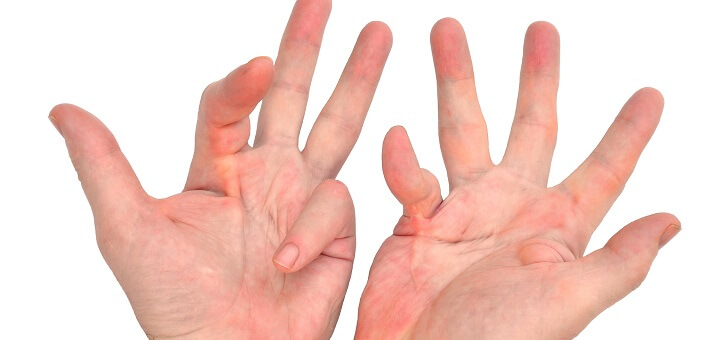Researchers have uncovered a breakthrough for Dupuytren’s disease, a common ailment that slowly deforms the hand.
Also known as Dupuytren’s contracture, the disease causes the fingers to deform due to a thickening under the skin. In many cases, this results in an affected finger bending in towards the palm, creating a ‘claw’ effect.
But a clinical trial conducted by Oxford University and the department of plastic surgery, NHS Lothian, indicates that a drug normally used to treat rheumatoid arthritis appears to reverse Dupuytren’s disease if used early enough.
In Western countries, Dupuytren’s disease affects as many as 29 per cent of those aged between 55 and 75. It most commonly affects the ring and little fingers, but can target others. It is far more prevalent among men than women.
Read: Healthy foods that trigger arthritis symptoms
The underlying cause of the condition is a thickening and shortening of a web of fascia that gradually causes clawing of the fingers as they are pulled towards the palm. Often progressing in fits and starts, the disease usually features a number of symptoms, including a lump or nodule appearing on the palm, usually close to the base of the ring or little finger, the appearance of a thickened cord running along the palm to the fingers, dimpled and puckered skin on the palm, and, over time, the fingers becoming clawed as they are pulled towards the palm.
Although the condition does not usually come with any associated pain, it can cause problems for sufferers, such as the affected fingers getting caught in pockets, difficulty in using a keyboard and holding a steering wheel.
Read: Seven common myths about arthritis
There are existing treatments for Dupuytren’s disease, but these have their drawbacks. The tissue can be cut out, but that treatment entails a risk of nerve and tendon damage, and the disease returns in about 20 per cent of treated patients within five years. Alternatively, a needle can be used to perforate and then snap the fascia cords, but those cords usually grow back.
The big advantage of the new treatment, if it proves to be successful, is that it is largely preventative, administered during the early phase of the disease. Professor Jagdeep Nanchahal, a surgeon scientist who led the trial at Oxford’s Kennedy Institute of Rheumatology, says the drug used in the trial “is a very safe drug and it’s important patients can access a treatment if it’s likely to be effective”.
The drug, known as adalimumab, is used for both rheumatoid arthritis and Crohn’s disease. Injections of adalimumab into nodules reduced their size and hardness compared with placebo injections. The drug works by blocking the signals from immune cells that tell ‘myofibroblasts’ to churn out fibrotic tissue.
Read: Gut feeling: Scientists discover unusual arthritis link
Volunteers received one injection every three months for a year. Follow-up examinations showed the lumps continued to shrink for nine months after the final injection. The drug is not cheap – it currently costs £350 ($622) per injection on the NHS in the UK – but could be a game changer for those afflicted.
The study’s authors said that while a follow-up over a period of approximately 10 years would be required to assess the effect on flexion deformity and hand function, the injections of adalimumab in participants with early stage Dupuytren’s disease resulted in softening and reduction in size of the nodules, and “might reduce progression of early stage Dupuytren’s disease”.
If you enjoy our content, don’t keep it to yourself. Share our free eNews with your friends and encourage them to sign up.

